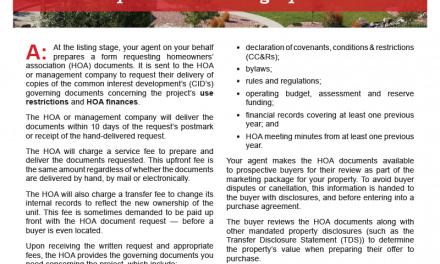Deposits retain trust status until disbursed as instructed
Consider a seller’s broker employed under an exclusive right-to-sell listing agreement. The listing states the broker will receive a fee set as a percentage of the purchase price and contingent on locating a buyer. The fee is earned and payable on delivery of a signed offer to purchase the property on the price and terms of payment stated in the listing agreement or accepted by the seller. [See RPI Form 102]
The broker locates a buyer. The buy makes an offer to buy the real estate. However, the purchase agreement fee provision calls for the seller’s payment of the broker’s fee at the close of escrow, not on acceptance as provided in the listing agreement.
The buyer’s check for the good faith deposit is made payable to the seller’s broker to apply toward the purchase price. On acceptance, the funds are deposited into the broker’s trust account.
The broker’s fee on the transaction is less than the amount of the buyer’s good faith deposit held in the broker’s trust account. The broker, without authorization from the buyer and the seller, withdraws the amount of their brokerage fee prior to closing the transaction. The broker claims the funds are the seller’s and withdrawal is permitted under the terms of the seller’s listing agreement.
Can the broker advance themselves the fee by a withdrawal from the buyer’s deposit held in their trust account prior to closing?
No! The broker is not entitled to their brokerage fee until the sale closes, as stated in the purchase agreement. The funds the broker withdrew from the trust account in advance of closing were still the buyer’s funds. The buyer’s funds were thus controlled by the terms of the buyer’s purchase agreement, not the seller’s listing agreement with the broker.
On withdrawal of the buyer’s funds, the broker unlawfully commingled trust funds with their separate funds. [Bell v. Watson (1957) 148 CA2d 684]
Advance fee trust fund accounting
Broker fees deposited with the broker before they are earned are called advance fees. Advance fees will be deposited in the broker’s trust account. The funds belong to the client of the broker, not the broker, and cannot be withdrawn by the broker before they are earned and a statement is sent to the client.
In addition to trust fund accounting requirements, a broker will send the client a verified accounting for the advance fees:
- no later than at the end of each calendar quarter, and
- at the time the contract between the broker and client is fully performed.
The verified accounting for the advance fees will include:
- the name of the broker;
- the name of the client;
- a description of the services rendered or to be rendered;
- an identification of the trust fund account and where the advance fee is deposited; and
- the amount of the advance fee collected. [Department of Real Estate Regulation §2972]
In addition, the verified accounting will include the amount disbursed for each of the following:
- costs for agreed-to services;
- fees paid to field agents and representatives; and
- overhead costs and profits. [DRE Reg. §2972(f)]
If an agreed-to service disbursed from the account is made for advertisement, the verified accounting will include:
- a copy of the advertisement;
- the name of the publication in which the advertisement appeared; and
- the number of ads published and the dates they appeared. [DRE Reg. §2972(g)]
Further, if the advance fee is for the arrangement of a mortgage, the verified accounting will include a list of the names and addresses of the persons to whom the information pertaining to the mortgage requirements was submitted, and the dates the information was submitted. [DRE Reg. §2972(h)]
The amounts placed in the trust account may be withdrawn:
- when expended for the benefit of the client; or
- on the fifth day after the verified accounting is mailed to the client. [Calif. Business and Professions Code §10146]
Approval of advance fee agreements
Before a broker may solicit, advertise for and agree to receive an advance fee, the paperwork material is to be submitted to the Commissioner of the California Department of Real Estate (DRE) for approval at least 10 calendar days prior to use. [DRE Reg. §2970]
If the Commissioner, within 10 calendar days of receipt, determines the material might mislead clients, the Commissioner may order the broker to refrain from using the material. [Bus & P C §10085]
To be approved by the Commissioner, the advance fee agreement and any materials to be used with the agreement will:
- contain the total amount of the advance fee and the date or event the fees will become due and payable;
- list a specific and complete description of the services to be rendered to earn the advance fee;
- give a definite date for full performance of the services described in the advance fee agreement; and
- contain no false, misleading or deceptive representations. [DRE Reg. §2970(b)]
Further, the advance fee agreement may not contain:
- a provision relieving the broker from an obligation to perform verbal agreements made by their employees or agents; or
- a guarantee the transaction involved will be completed. [DRE Reg. §§2970(b)(4), 2970(b)(5)]














